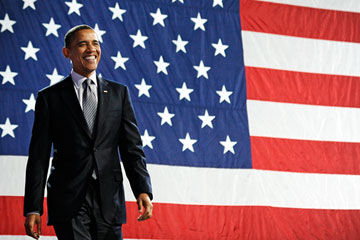
Barack Obama will be sworn into office Jan. 20 as only the seventh U.S. President to have been elected in consecutive terms with more than 50% of the vote. And yet he is still routinely charged with not being fully American and not embracing the idea of American exceptionalism. Because of his race, his name and his international parentage, Obama has had to work hard to assuage anxieties prompted by what some see as his otherness.
The patriotism of most Presidents is taken for granted. Not so with Obama. That may be why, even as he dramatically revises American history through his own success, he avoids challenging the myths that Americans live by. It isn't that he's not enough of an American exceptionalist; it's that he's too much of one.
During his first campaign, Obama initially took the position that he would refrain from wearing the American-flag pin that virtually all presidential candidates wear. That departure from ritual, however, was only momentary and has been followed by few, if any, such reprises. Critics on the right complain about political correctness--excessive sensitivity to perceived racism, sexism and other bigotries--but the most powerful form of political correctness in America is patriotism that revels in national idolatry. Ambitious politicians take care not to run afoul of it. And so, in line with previous Presidents, Obama lauds the pioneers who "blazed" a westward trail but never mentions the systematic acts of ethnic cleansing by which the U.S. wrested lands from Indian nations. He praises the Founding Fathers, making no mention of the slaves who fled them or of the fact that many more blacks and Indians fought on the side of King George than with George Washington.
Sure, Thomas Jefferson and James Madison countenanced slavery. But the consequence of their bargain with human bondage, Obama implies, redeemed them. After making a deal with Republicans over tax policy, Obama criticized the Democrats who had opposed it, remarking that "this country was founded on compromise." Ironically, the first black President thus embraced the nation's Founding Deal, eschewing the denunciations of abolitionists who maintained, in the words of William Lloyd Garrison, that the Constitution was "a covenant with death."
Obama's sensibility is anything but countercultural. In his White House, the portrait of Andrew Jackson will likely continue to occupy an honored place, notwithstanding Old Hickory's depredations against Indians and his participation in the enslavement of blacks. In 2009 a group of scholars petitioned the President to forgo sending a wreath to the Arlington Confederate Memorial, a practice established by Woodrow Wilson in 1914. Noting that the memorial "was intended to legitimize secession and ... glorify the Confederacy," they asked Obama to stop honoring men who were willing to die to protect slavery. Obama continued the tradition--though he also sent a wreath to the African American Civil War Memorial, establishing a dubious equivalency.
